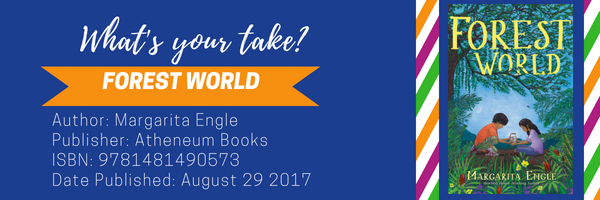This month we examined four books that portray the theme of Sense of Place. A sense of home or belonging is incredibly valuable to humans. The books selected for this month highlight characters who discover that special sense of place, or must leave their longtime place and find a new one. Our final book for the month of August is Forest World.

YOO KYUNG: A Cuban-American teenager living in Florida, Edver, travels to see his father and unknown sister Luza in Cuba. With a one year age difference, they know it will take time to get to know each other as newly-discovered siblings. However they both want to make sense of the unique shape of their family and even recover la familia. When they were new to each other their cultural differences seemed to set them farther apart. Edver grew up in Florida and needs a smartphone and the internet to have true fun, while Luza’s idea of fun can be anything in herbackyard/forest, not internet games. Despite these differences they quickly develop siblinghood as they learn more about each other.
When they reach the agreement to save the forest animals and insects from the Human Vacuum Cleaner, a wildlife smuggler, they become the perfect unit. The atypical scientist mother who is often hard to get hold of helps Edver and Luza to see that they actually have shared feelings and thoughts as a family.
In this book, a sense of place is rebuilt through the forms of separations, (dis)connection, empathy, validation, understanding, collaboration and acceptance. The beautiful Cuban environment is nearly a form of ecological art. The forest and many kinds of its living residents define their sense of place and grow to be a value that Luza and Eder share. They feel a responsibility to advocate for wildlife protection since much wildlife has already become extinct over the years. This particular book displays a sense of place that takes patience, acceptance and responsibility to protect the ecosystem of the forest.
MICHELE: One thought that remains with me after reading this story is how difficult it is for one family to live separate lives in contrasting places. One half of the family (mother and son) live in Florida while the other half (father and daughter) live in the forest of Cuba. These places are very different physically and culturally; however both parents are committed to doing work that furthers the same cause while leading separate and independent lives. At one point in the story, Luza notes, “it happens all the time in Cuba,” referring to the fact that it is typical for some families to live separately and in isolation from one another.
The story is told from contrasting perspectives: Edver who is two years younger than his sister and was raised in urban Florida with his mother; and Luza who was left in the forest in Cuba as a young child and raised by her grandparents and her father. Both voices provide the reader with deep insight into their thoughts and perspectives.
There is a dark, secretive tone and an element of sadness that the characters project throughout the story. Edver and Luza are adolescents who are very angry, hurt and betrayed by their parents. They live with unanswered questions and confusion about their past: Why did the family separate? Why was Luza left behind as a young child while Edver was taken to live with their mother? Why didn’t their mother tell Edver about Luza? Luza notes that life was good “when we all lived together as a family, rooted in our forest and winged with shared dreams.”
Through the characters we learn so much about the insects and beauty of the physical place in Cuba; yet the children are curious to know more about the person their mother is. Their thoughts indicate resentment towards her for abandoning them; whether it is her actual abandonment of Luza as a young child or her lack of mental and emotional presence for Edver who lives with her.
It makesme wonder, at what point do people sacrifice their families and personal lives for a greater cause? What makes one leave their community and sacrifice having a sense of place for a larger purpose?
This is the final installment of August’s My Take/Your Take series. The first week of the month we discussed Moonrise, the second week we talked about Pablo Finds a Treasure and last week’s selection was Insignificant Events In the Life of a Cactus. Check back next week for a new topic and more book discussions!
Title: Forest World
Author: Margarita Engle
Publisher: Atheneum Books for Young Readers
ISBN: 9781481490573
Date Published: August 29 2017
- Themes: Forest World, Margarita Engle, Michele Ebersole
- Descriptors: Books & Resources, My Take/Your Take
